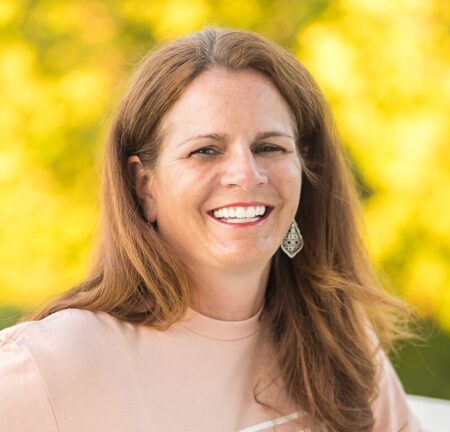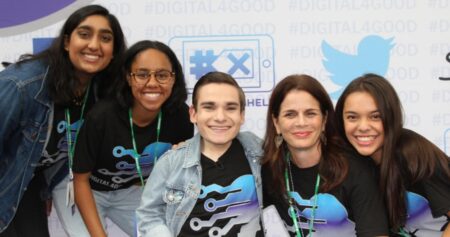With devices and digital platforms more commonplace than ever, digital citizenship is an urgent and complex matter facing schools and students nationwide. But what, exactly, does that mean? And how should schools be thinking about modeling, instilling, and cultivating digital citizenship?
We caught up with Kim Karr, founder of Digital4Good and #ICANHELP–a nonprofit committed to leading, educating, and engaging students and educators on digital safety, wellness, and citizenship–to learn more. Here’s what she had to say about the challenges and opportunities, and how we can work together to address them.
Class Intercom: What led you to start Digital4Good?
Kim Karr: I was a middle school teacher for 13 years. I started seeing the rise of devices and social media and then things like fake pages, hate pages, passive aggressive texts, inappropriate pictures and people asking for them. Students just didn’t know how to handle a lot of these scenarios, so I found myself educating them on how to manage it–what they can do, who they can go to, et cetera. Forty eight percent of students don’t turn to adults for help online. There are different reasons for that. The main reason for middle schoolers is that they’re afraid their device will be taken away. For high schoolers, it’s the issue of the snitches-get-stitches mentality. So it’s important to remind them that at some point they’re no longer being a snitch, and they truly need to help.
CI: Tell us more about the Digital4Good Summit specifically?
KK: We created the Digital4Good Summit because you have to celebrate these students using digital for the right reasons. As adults, our tendency can be to talk about all the negative stuff without taking time to celebrate the good things that are happening online and through digital platforms. If we always talk about the negative, that becomes the focus. Digital4Good gives us an opportunity to talk about and celebrate all the positive. In doing so, we hope to inspire students and provide a way for them to inspire their peers–both other students and adults–to come together and work side by side with student change-makers doing really cool stuff online.

Kim Karr, founder of Digital4Good and #ICANHELP
CI: How do you approach teaching students and schools how to use digital for good?
KK: We basically want to teach students to be digital first responders. It starts with: If you see something, say something. So, instead of just scrolling past or saying “oh, that’s messed up,” but reporting it, which includes knowing the steps to take to do so. Reporting can be anonymous, but there are other ways to speak up–DMing the person privately, commenting respectfully, and then getting other people to comment respectfully. In fact, that’s one use for the #ICANHELP hashtag. It’s basically a signal for telling people they’ve crossed a line and also letting adults know so they can intervene. A lot of times, it’s about empowering students to bring a situation to someone’s attention so it can be addressed.
CI: How does student voice fit into all of this?
KK: We believe students need to be part of the solution. If they’re part of the problem, then they also need to be part of the solution. They need to have a seat at the table. Our approach is that we never want to be in front of them knowing more than they know. In the same respect, we don’t want to be behind them knowing less. Students have to be equal partners. And we–as resources, schools, and educators–need to be on top of trends and challenges so we can dig in instead of just telling students to get offline. That’s a common approach, but the reality is that students are online, and they need to be online as part of their day-to-day. So, we have to figure out how to work together.
CI: What do schools–or even just people in general–get wrong about digital citizenship?
KK: There can sometimes be the mentality that social media is horrible. The reality is that social media is a tool that can be really useful and valuable. At the same time, when people use it for the wrong reasons or with the wrong intentions, there can be negative consequences. That makes it all the more important for us to train people on how to use it correctly and responsibly. And it’s everyone’s responsibility. That’s one reason we bring the major tech companies into Digital4Good. We want to work side-by-side with them and create opportunities to exchange information and feedback so that everyone can make a difference.
CI: What does a healthy school culture look like?
KK: In a good culture, you can feel that students are comfortable–comfortable being there, comfortable going to others for help. Adults are inviting students to the table for change and hearing where the issues are and how they think they can be fixed. The schools lacking when it comes to culture are those that don’t invite student into the conversation and instead focus on discipline. Even students who speak up about a fight or an issue are disciplined because they’re not supposed to have their phones out. Now, the kid trying to help is actually in trouble instead of everyone working together to be part of a solution.
People need to know that this isn’t just a community issue–it’s a global issue. Everyone can come be part of the solution. Everybody can help. The question is: Will you?.
"It’s everyone’s responsibility. That’s one reason we bring the major tech companies into Digital4Good. We want to work side-by-side with them and create opportunities to exchange information and feedback so that everyone can make a difference."
Learn More
Class Intercom is proud to be the official technology platform for Digital4Good. We’re honored to work with a diverse group of partners across the nonprofit, public, and private sectors to help schools, students, and educators create safe and healthy learning environments.
If you’re interested in working with Class Intercom, click the button below to get in touch.
